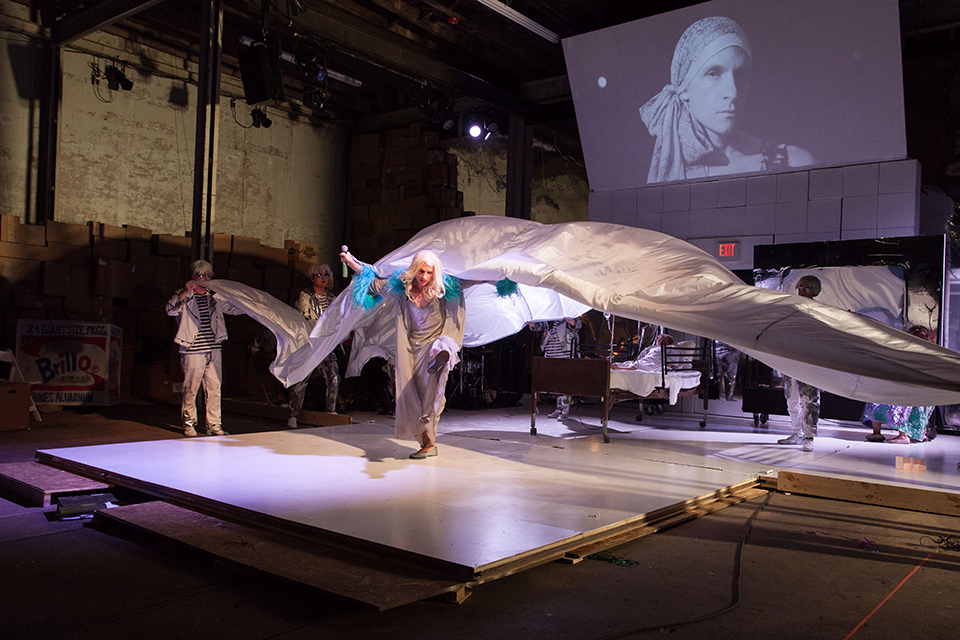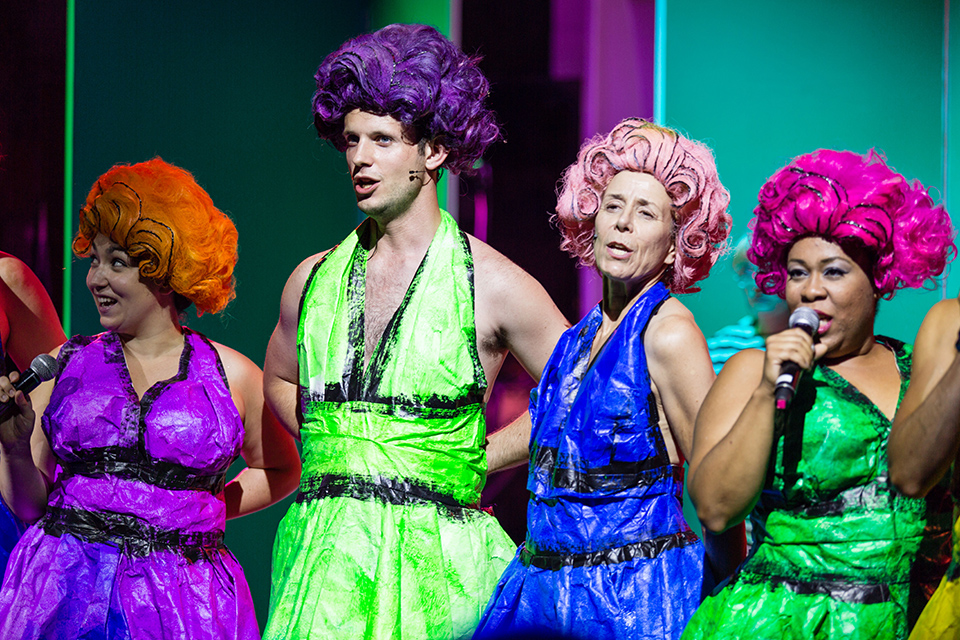
‘Something new and strange, something never before seen in opera’: What happens when a cabaret and the opera collaborate
Two and half years after its inception, “ANDY: A Popera,” a daring cabaret-opera mash-up developed by the Bearded Ladies, a cabaret company, in collaboration with Opera Philadelphia, has its world premiere at a warehouse in North Philadelphia tonight, Sept. 10. The new work, part of the Fringe Festival, was funded in part by a Knight Foundation grant.
Based on the life and work of pop-art icon Andy Warhol, the collaboration represented a leap of faith in both artistic and practical terms, given the differences in size, organizational structures, work styles and audiences between a traditional cultural institution and a small, experimental group. The response thus far has been enthusiastic: This first run of “ANDY: A Popera,” Sept. 10 – 20, has already sold out.
“The goal was to create something completely new and strange, something that no one has ever seen in opera, and I feel we are approaching it,” says John Jarboe, artistic director of the Bearded Ladies. “We’ll see how it’s received, but I feel it’s very bold in terms of location and in terms of the framing of it. I think both companies are doing a really great job stretching our limits.”
For David B. Devan, general director and president of Opera Philadelphia, the goal was bringing together the cabaret and opera worlds, not only artistically but their audiences. Part of that of that effort was holding the performances at a warehouse instead of the opera house.

“We wanted people who were opera subscribers, people who were ready for a new adventure and we also wanted people who’ve never been to an opera but go to the Fringe Arts, the theatre scene and the cabaret. And early data suggests that over 30 per cent of the audience has never been at an Opera Philadelphia performance — and I think it’s going to go both ways.”
The performing ensemble features not only the Bearded Ladies but also members of the Opera Philadelphia chorus, whose participation became a high point in the collaboration, says Jarboe.
“The chorus at Opera Philadelphia is full of artists. They’re wonderful and they have given a lot to this piece,” he says. “The opera world right now is not set up to do new work. The cost of time and the union rules are prohibitive to making new art. So we really run up against it in certain ways, but Opera Philadelphia has been really great about that, and the union made some concessions that have been really useful, so we could bring the opera chorus singers into our process and treat them like full artists.”
“I’ve learned a lot working with opera singers and about working with more rigid schedules,” says Jarboe. “It feels like we are driving an ocean liner and not a sports car anymore, which is what the Bearded Ladies are used to. We are used to flexibility and the opera is such a big machine. It’s hard to have artistic flexibility, but we are bringing some of that to the work and we are still adjusting here and there. We have to be really careful about how we do that so it trickles up in the way that he needs to.”
Devan notes that “many” of the 12 chorus singers appearing in ANDY are also performing in the Opera Philadelphia’s staging of La traviata, which opens next month and is already in rehearsals.

“The way the Beards work, has required that our singers stretch themselves in remarkable ways […] and they were so happy. These are classically trained artists who have found a new way to do what they do — and that infects in a good way the whole opera organism at Opera Philadelphia.”
“I go to the first chorus rehearsal of “La traviata” and […] there’s a more buoyant energy in the room and that energy comes from us embracing our artists, putting them in the spotlight and giving them artistic opportunities to stretch and grow. That’s a great thing ANDY is doing for our practice.”
As for the challenges of collaborating with a small troupe in such innovative project, Devan says that “an opera company infrastructure is largely about producing work written by dead guys; and cabaret is about marrying low art with high ideas in an inventive way that happens in the moment. Marrying that infrastructure to that project, not the people in it, was the challenge.”
The other important consideration was the opera subscribers and finding ways to reach them and interest them in trying the new works.
“When we have done projects like ANDY and Svadba-Wedding, which Knight also supported, we are very careful to make them electives,” explains Devan. “We don’t have them in a subscription package. I think that’s the way you can grow your artistic practice. So the people who are ready for the journey, go on the journey. We are doing “Cold Mountain” in February, it’s a new commission that’s part of our subscription series. You have to do [new works] in a way that allows people to come to them as opposed to you pushing the experience on them.
“The other thing that we have done, is that we don’t do this projects until they are fully funded,” says Devan. “That way we don’t create budget problems with our new program and we don’t take away from “La traviata” to produce Andy. I think that’s key.”
As for developing new audiences, Jarboe adds a practical note to his assessment of the collaboration.
“It is completely sold out. I think we are going to have to add shows. People are thrilled to see something really new,” he says. “I am humbled that Opera Philadelphia is working with us, but I also think mixing our audiences is a very smart choice. We are diversifying our audiences.”
Fernando González is a Miami-based arts and culture writer. He can be reached via email at [email protected].
Recent Content
-
Artsarticle ·
-
Artsarticle ·
-
Artsarticle ·

